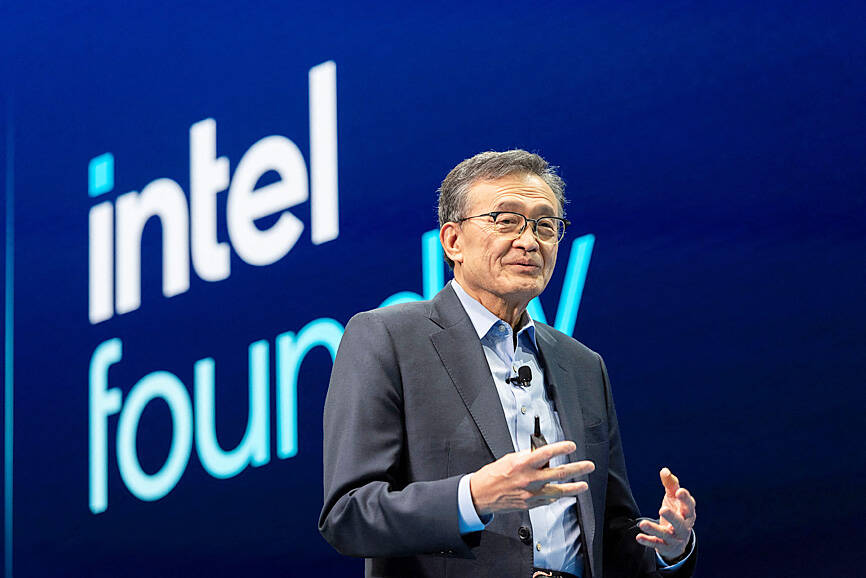Intel Corp CEO Lip-Bu Tan (陳立武) dismissed reports about a new hire taking trade secrets from Taiwan Semiconductor Manufacturing Co (TSMC, 台積電) to his company, saying the US chipmaker respects other firms’ intellectual property (IP).
Taiwanese newspapers spent the week reporting on the transition of Lo Wen-jen (羅唯仁), 75, from his retirement from TSMC earlier this year to joining Intel in recent weeks. The executive is alleged to have taken proprietary know-how from his former employer just before his departure.
“It’s rumor and speculation. There’s nothing to it. We respect IP,” Tan told Bloomberg News on the sidelines of the Semiconductor Industry Association Awards in San Jose on Thursday.

Photo: Reuters
The event recognized TSMC CEO C.C. Wei (魏哲家) and former chairman Mark Liu (劉德音) with its highest honor, the Robert N. Noyce Award.
Now valued at more than US$1.15 trillion, TSMC has become the undisputed global leader in contract chipmaking, surpassing semiconductor pioneer Intel. The company’s proprietary data and fabrication techniques are highly prized trade secrets and a matter of strategic importance for Taiwan.
Local prosecutors have started looking into the reports to see whether any person broke any law, High Prosecutors’ Office spokesman John Nieh told Bloomberg News.
TSMC has opened an internal investigation about whether Lo has taken trade secrets without its consent, a person familiar with the matter said.
It is unclear whether TSMC has reached a conclusion about any potential damage to the company, the person added, asking not to be identified as the information is private.
Lo was responsible for corporate strategy before his retirement from TSMC in July. He was at one point in charge of research and technology development at TSMC, and played a key role in facilitating the mass production of cutting-edge chips, including those used to make artificial intelligence accelerators. He is also a laureate of the Industrial Technology Research Institute.
Before he joined TSMC in 2004, Lo spent some time at Intel focusing on advanced technology development, including running a chip factory in Santa Clara, California. He has a doctorate degree in solid state physics and surface chemistry from the University of California Berkeley.
Relations between Intel and TSMC have been fraught over the past few years, as the US chipmaker tries to play catchup in the technology race. Intel is at once a customer and a competitor to TSMC, which enjoys the enviable position of being the sole maker of the most high-end chips for Apple Inc and Nvidia Corp.
Former Intel CEO Pat Gelsinger frequently argued that it was too risky for the US to depend heavily on TSMC for cutting-edge semiconductors due to growing geopolitical volatility in the Taiwan Strait, creating friction between the two companies.

NEW IDENTITY: Known for its software, India has expanded into hardware, with its semiconductor industry growing from US$38bn in 2023 to US$45bn to US$50bn India on Saturday inaugurated its first semiconductor assembly and test facility, a milestone in the government’s push to reduce dependence on foreign chipmakers and stake a claim in a sector dominated by China. Indian Prime Minister Narendra Modi opened US firm Micron Technology Inc’s semiconductor assembly, test and packaging unit in his home state of Gujarat, hailing the “dawn of a new era” for India’s technology ambitions. “When young Indians look back in the future, they will see this decade as the turning point in our tech future,” Modi told the event, which was broadcast on his YouTube channel. The plant would convert

‘SEISMIC SHIFT’: The researcher forecast there would be about 1.1 billion mobile shipments this year, down from 1.26 billion the prior year and erasing years of gains The global smartphone market is expected to contract 12.9 percent this year due to the unprecedented memorychip shortage, marking “a crisis like no other,” researcher International Data Corp (IDC) said. The new forecast, a dramatic revision down from earlier estimates, gives the latest accounting of the ongoing memory crunch that is affecting every corner of the electronics industry. The demand for advanced memory to power artificial intelligence (AI) tasks has drained global supply until well into next year and jeopardizes the business model of many smartphone makers. IDC forecast about 1.1 billion mobile shipments this year, down from 1.26 billion the prior

People stand in a Pokemon store in Tokyo on Thursday. One of the world highest-grossing franchises is celebrated its 30th anniversary yesterday.

Zimbabwe’s ban on raw lithium exports is forcing Chinese miners to rethink their strategy, speeding up plans to process the metal locally instead of shipping it to China’s vast rechargeable battery industry. The country is Africa’s largest lithium producer and has one of the world’s largest reserves, according to the US Geological Survey (USGS). Zimbabwe already banned the export of lithium ore in 2022 and last year announced it would halt exports of lithium concentrates from January next year. However, on Wednesday it imposed the ban with immediate effect, leaving unclear what the lithium mining sector would do in the